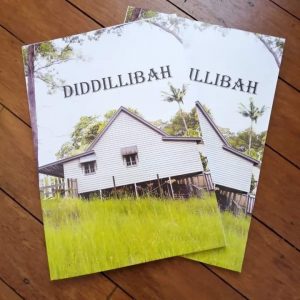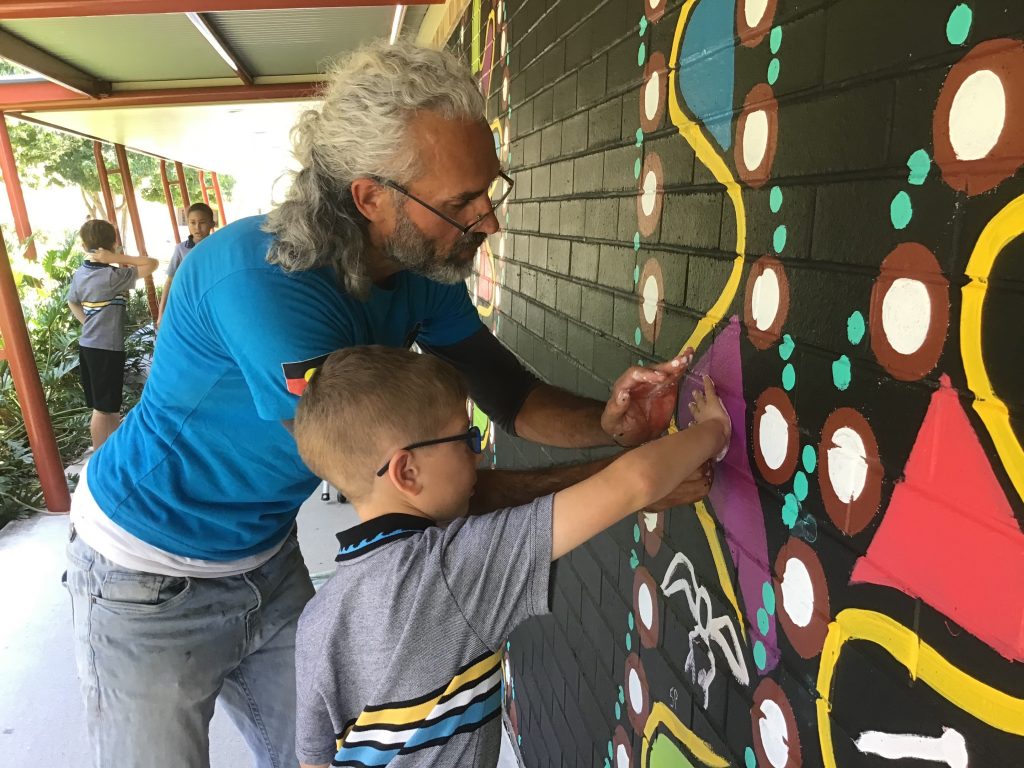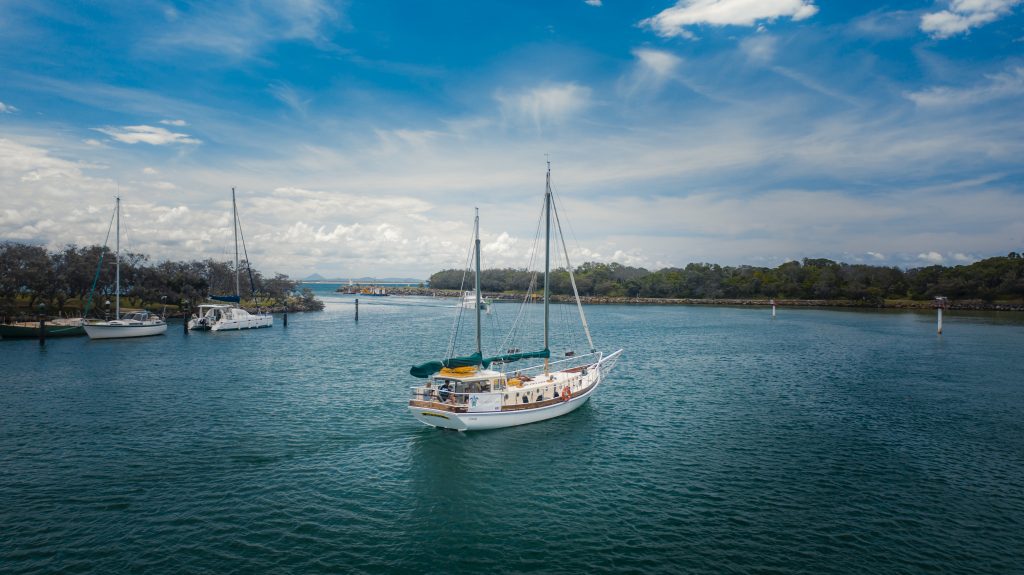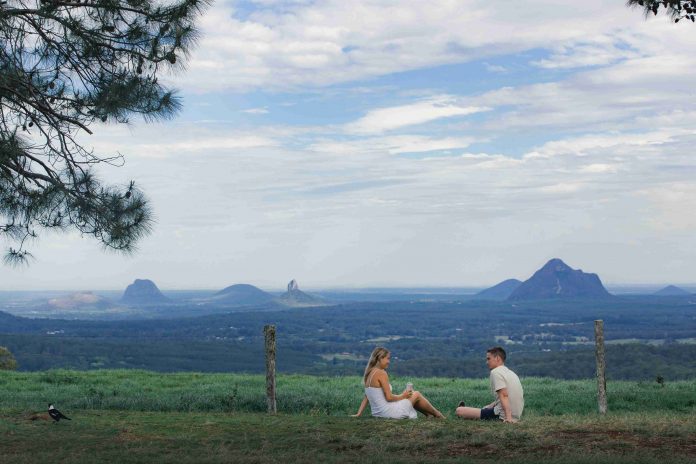It’s a story as colourful as the volcanic soils of Mount Beerwah and the blue of the waters off Mudjimba Island – embedded in the heart of our coastal and hinterland community.
The full and vibrant history of the Sunshine Coast cannot be written, spoken, illustrated or understood without it.
The message of our First Nations culture and heritage is spreading on the wings of emerging and already established local initiatives spanning business, tourism, education and even cooking.
Two of the people helping to ensure our shared history lesson comes alive for current and future generations are long-time educators Peter Lawrence and his wife Sally, who now runs Sally Lawrence Consultancy. Services including webinars, tours, training and presentations to help connect businesses, schools and the community to the Indigenous story.
SUBSCRIBE here now for our FREE news feed, direct to your inbox daily.
Although a non-Indigenous woman, Sally has spent more than 20 years working exclusively with Aboriginal and Torres Strait Islander communities in education – including early career and specialist positions within Torres Strait and the mainland, and as manager for Indigenous Education in the North Coast region, influencing many Queensland strategies and programs.
Peter, a historian, writer, researcher and teacher of 25 years, recently added an Indigenous Heritage chapter to the third edition of author Eunice Paulett’s book Diddillibah.

The book was first launched in 2022, weaving together a tapestry of historic facts, old photos and maps and stories gathered from descendants of many of the pioneer families, including Lynette Walker and Jenny Catalano (nee Mackay).
Even while concentrating on only one hinterland village, Peter’s chapter paints a picture of the rich First Nations heritage and culture intrinsically associated with the Sunshine Coast.
“It is a bit of a myth that only more remote places have a culture,” he told Sunshine Coast News.
“It is all around us, embedded in the land, the names of our suburbs, animals and plants and their ongoing association with people.
“Both Sally and I wanted to ensure that a new version of the Diddillibah book acknowledged that this land was occupied before Europeans came to this area by Kabi Kabi/Gubbi Gubbi people and that this continues today.”
Peter identifies as a Yugarapul man as part of his father’s family connection to the Rosewood Scrub, west of Ipswich, where his great-grandmother was born.
He said his father’s family had moved to Brisbane in the late 19th century but had been living in and around this region for nearly 100 years, mainly in Caboolture and the Glass House Mountains area.

“My father’s side is Aboriginal-English while my mother’s side is mainly of German heritage and they have been on the Coast since approximately 1930 when my great-grandparents moved here,” he said.
“Recognising First Nations culture and heritage as a part of any history on the Sunshine Coast enables us to tell the full story of our shared history.
“It demonstrates that we are hopefully maturing as a nation and coming to terms with our shared stories. Whilst some of these events which occurred historically are based on terrible conflict and control, it is important to recognise this to reconcile the past and work together.
“Truth telling is the first step in reconciliation. For some Australians or people new to the Sunshine Coast area, recognition of this past may only be occurring now but more people are learning this during their schooling, which is a great thing.
Like stories about Sunshine Coast people doing great things? Help us deliver more by registering for our FREE daily news feed. All it requires is your name and email at the bottom of this article.
“Through the new Australian Curriculum Version 9 there are many opportunities to learn about First Nations perspectives and there are also opportunities to learn using 8 Ways Pedagogy and Uncle Ernies’ Framework – both of which are supported by the Queensland Curriculum and Assessment Authority as ways of learning.”
Peter said many First Nations enterprises in the region were helping to better educate the community on First Nations culture, including the Gubbi Gubbi Dance Troupe with Lyndon Davis, and Kabi Kabi man Kerry Neill with the Tribal Link activity centre at Mapleton.
Brianna Hanson, of Maroochydore’s Wattle It BRI, is a Kabi Kabi woman and presenter who facilitates Yarning Circles on shared history, cultural protocols and string making.
Aunty Dale Chapman’s My Dilly Bag at Forest Glen is an exceptional chef and provider of bush tucker products.

Saltwater Eco Tours forges a deeper connection to Indigenous culture through unique marine experiences on board a beautifully restored Heritage-listed vessel plying the Mooloolah River.
Peter said First Nations heritage is embraced in the local place names for our suburbs and towns that are of Kabi Kabi origin, or sometimes Yuggera such as Caboolture: “the place of the carpet snake”.
“Diddillibah is the place of the grass used to make string and dilly bags,” he said.
“Bli Bli is based on the bilai or she-oak and is a significant site. Nambour (Namba: bottle brush) Showgrounds was a corroboree ground and gathering place, as was the area which is now Sandstone Point – both of which are still gathering grounds for our community.
“So language reveals a place and a people and sometimes a purpose. The Jinibara people are the other traditional owners who are recognised on the Sunshine Coast as having a deep and ongoing connection to this area.
“It needs to be recognised that there was and is great diversity within the First Nations community.
“Community groups and businesses can improve their awareness by having a Reconciliation Action Plan but as a starting point, people can come to NAIDOC this year on July 8 at Cotton Tree, which is a great day to catch up with family and friends but also make new connections, regardless of your background.”
To buy the Diddillibah book, order online with your details and direct deposit into the Diddillibah Hall account, or call Sally Lawrence on 0439 884 988.
Help us deliver more news by registering for our FREE daily news feed. All it requires is your name and email at the bottom of this article.





